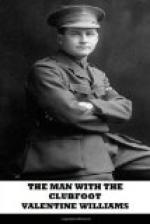Once more the original object of my journey into Germany stood clearly before me. An extraordinary series of adventures had deflected me from my course, but never from my purpose. I realized that I should never feel happy in my mind again if I left Germany without being assured as to my brother’s fate. And now I was on the threshold either of a great discovery or of an overwhelming disappointment.
For the street called In den Zelten was my next objective. I knew I might be on the wrong track altogether in my interpretation of what I was pleased to term in my mind the message from Francis. If I had read it falsely—if, perhaps, it were not from him at all—then all the hopes I had built on this mad dash into the enemy’s country would collapse like a house of cards. Then, indeed, I should be in a sorry pass.
But my luck was in, I felt. Hitherto, I had triumphed over all difficulties. I would trust in my destiny to the last.
I had taken the precaution of turning up my overcoat collar and of pulling my hat well down over my eyes, but no one troubled me. I reflected that only Clubfoot and Schmalz were in a position to recognize me and that, if I steered clear of places like hotels and restaurants and railway stations, where criminals always seem to be caught, I might continue to enjoy comparative immunity. But the trouble was the passport question. That reminded me.
I must get rid of Semlin’s passport. As I walked along I tore it into tiny pieces, dropping each fragment at a good interval from the other. It cost me something to do it, for a passport is always useful to flash in the eyes of the ignorant. But this passport was dangerous. It might denounce me to a man who would not otherwise recognize me.
I had some difficulty in finding In den Zelten. I had to ask the way, once of a postman and once of a wounded soldier who was limping along with crutches. Finally, I found it, a narrowish street running off a corner of the great square in front of the Reichstag. No. 2 was the second house on the right.
I had no plan. Nevertheless, I walked boldly upstairs. There was but one flat on each floor. At the third story I halted, rather out of breath, in front of a door with a small brass plate inscribed with the name “Eugen Kore.” I rang the bell boldly.
An elderly man-servant opened the door.
“Is Herr Eugen Kore at home?” I asked.
The man looked at me suspiciously.
“Has the gentleman an appointment?” he said.
“No,” I replied.
“Then the Herr will not receive the gentleman,” came the answer, and the man made as though to close the door.
I had an inspiration.
“A moment!” I cried, and I added the word “Achilles” in a low voice.
The servant opened the door wide to me.
“Why didn’t you say that at once?” he said. “Please step in. I will see if the Herr can receive you.”




